Intern Doctor Resume Examples

Jul 18, 2024
|
12 min read
"Crafting the perfect intern doctor resume: from med school to making rounds with ease. Learn the skills you need to stand out in your application and get the job you deserve."
Rated by 348 people
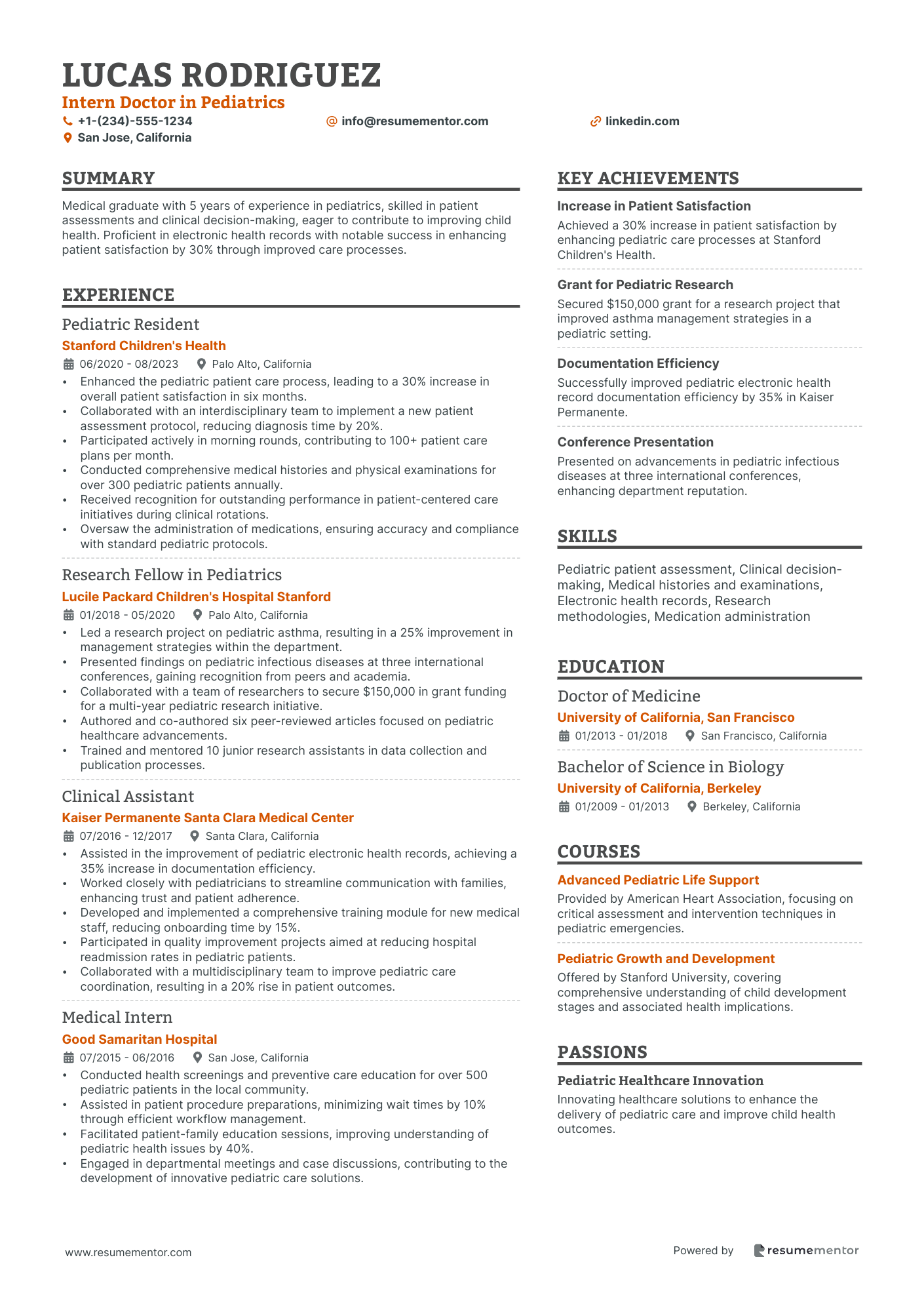
Intern Doctor in Pediatrics
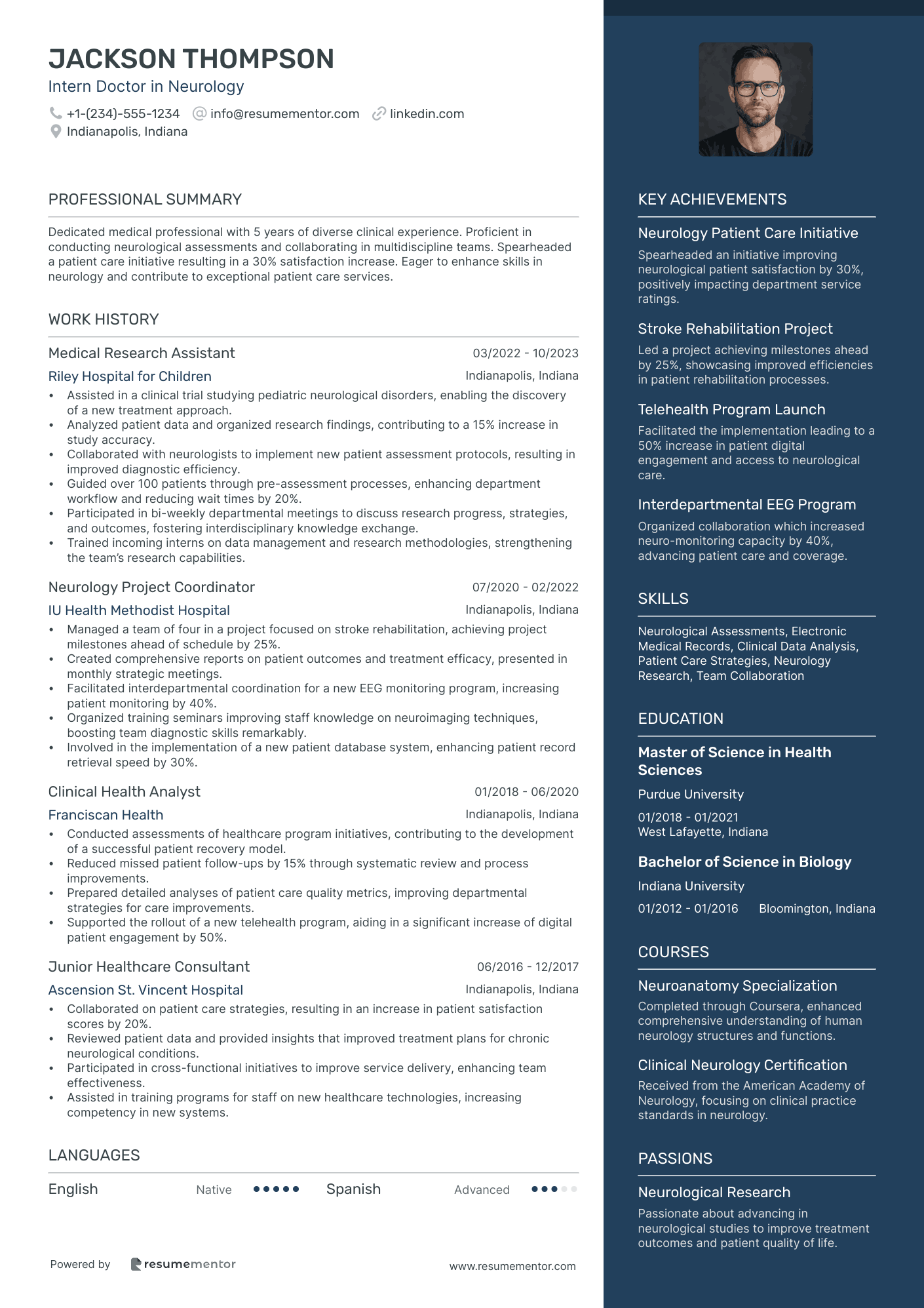
Intern Doctor in Neurology
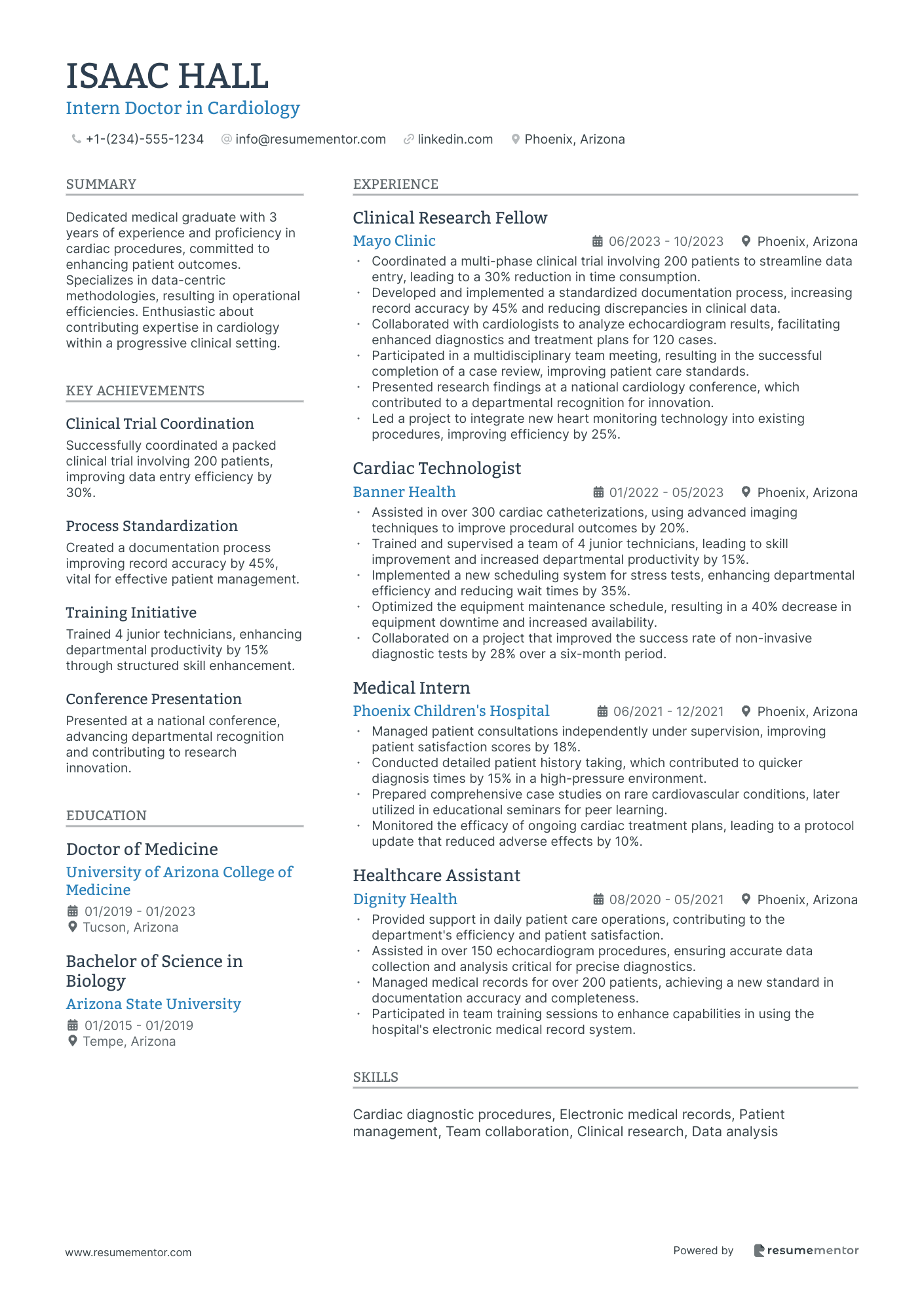
Intern Doctor in Cardiology
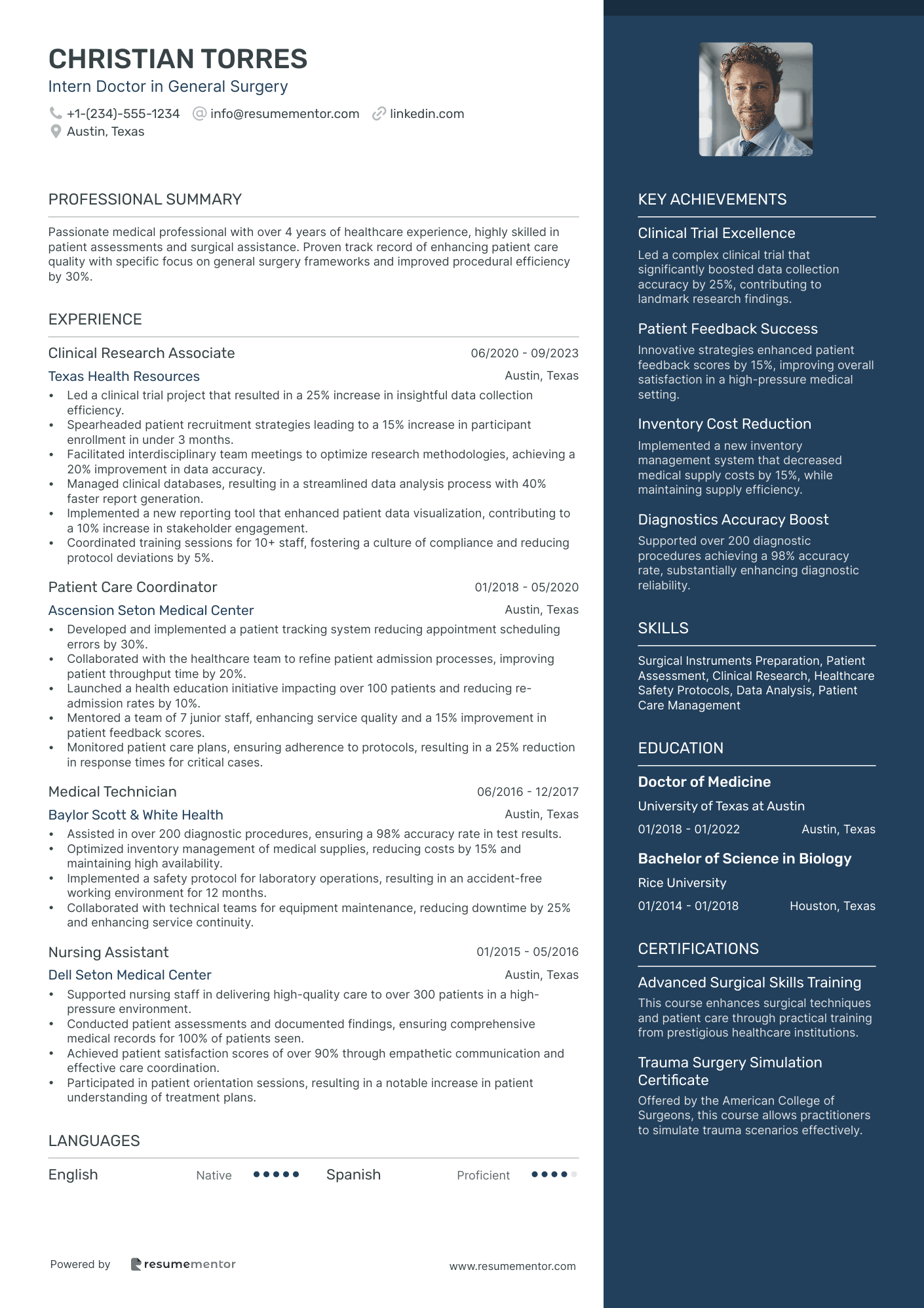
Intern Doctor in General Surgery
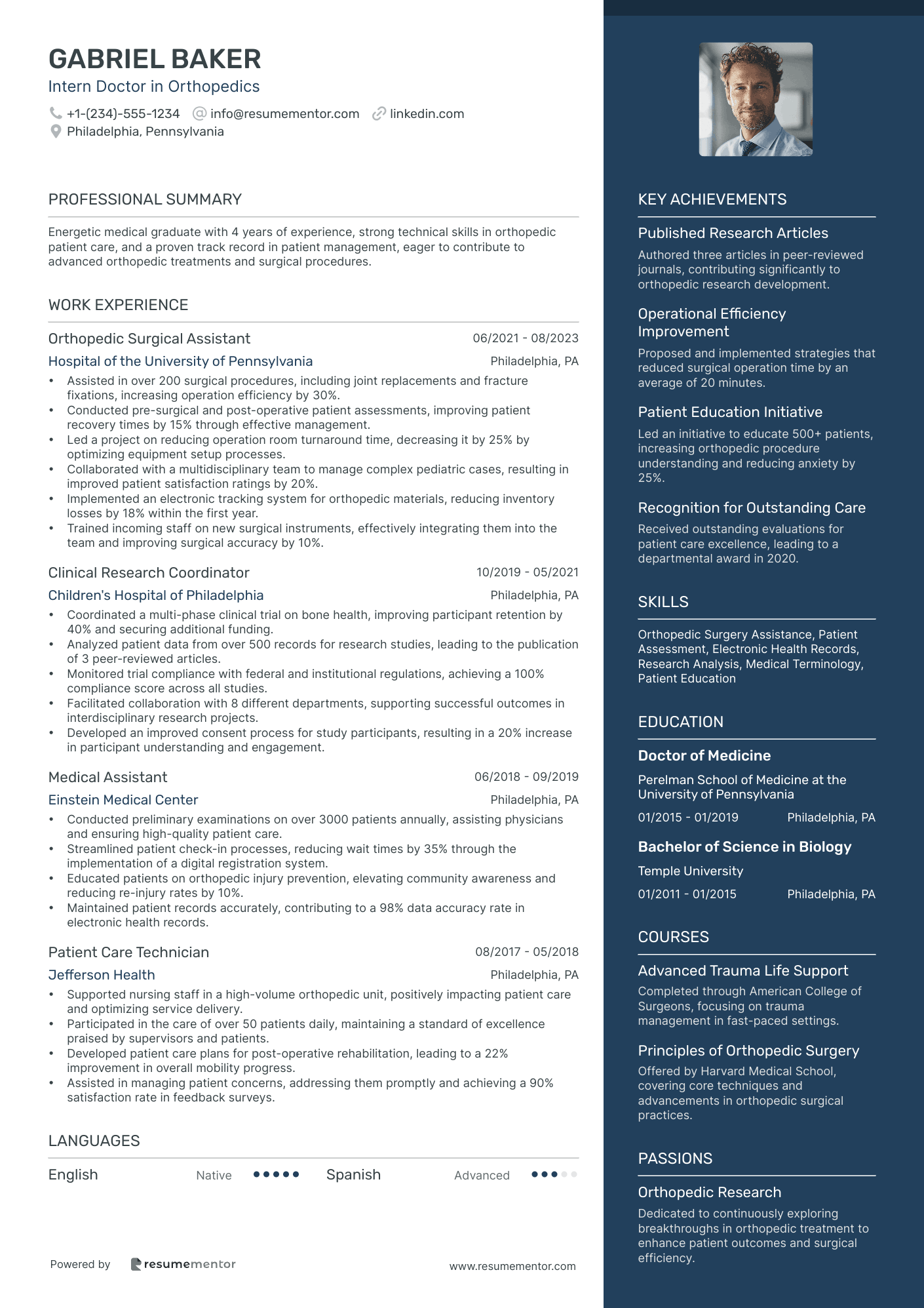
Intern Doctor in Orthopedics
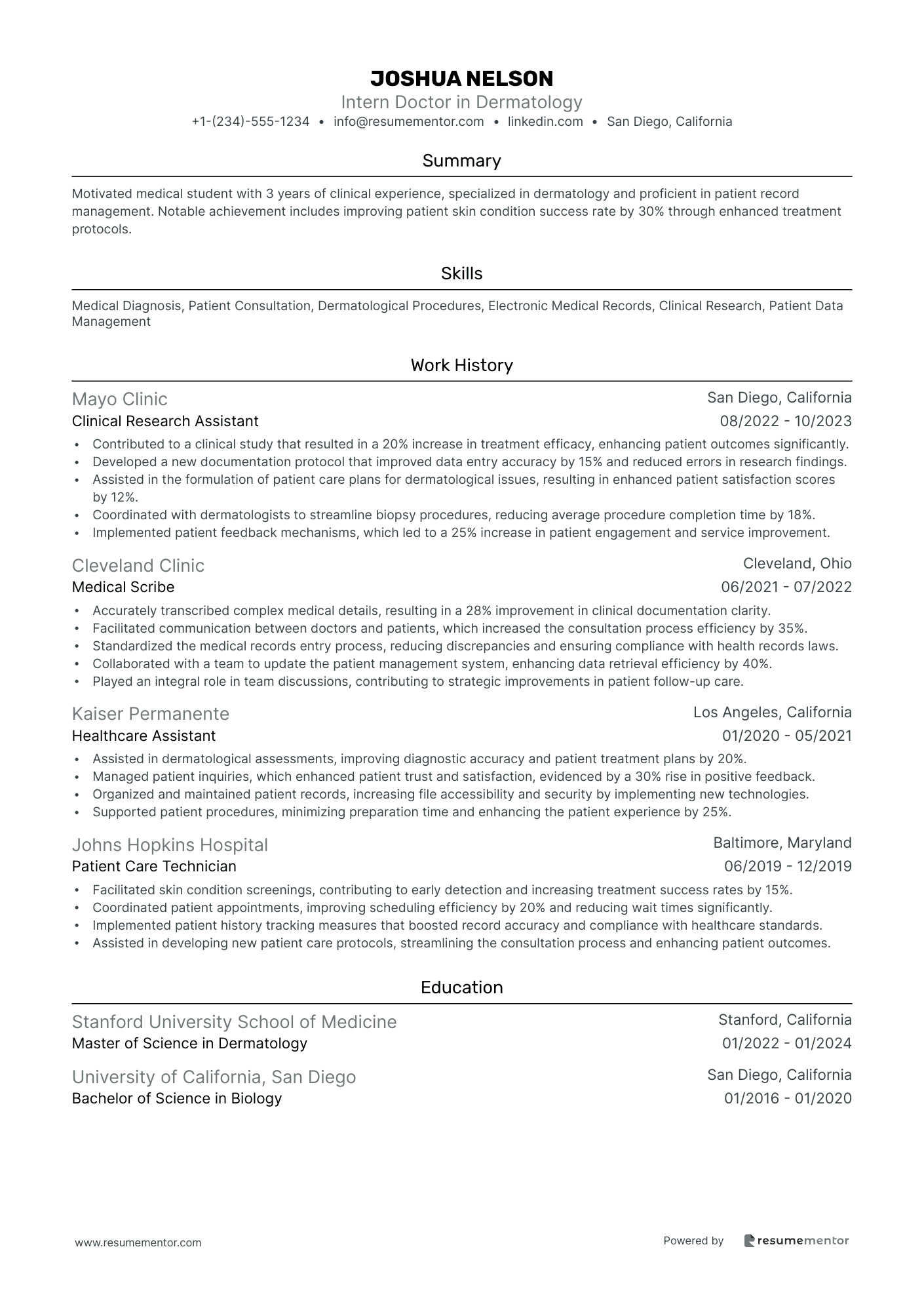
Intern Doctor in Dermatology
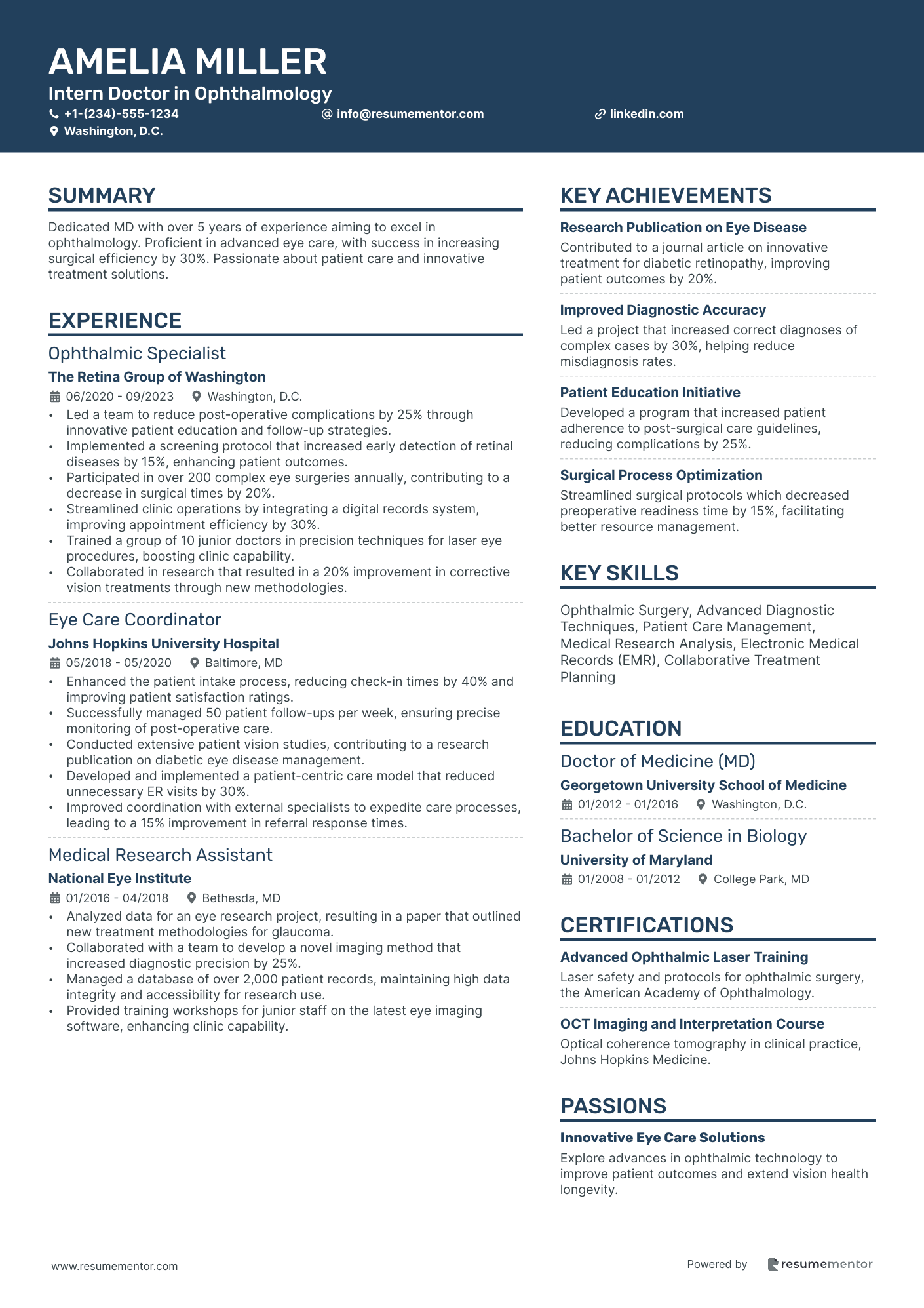
Intern Doctor in Ophthalmology
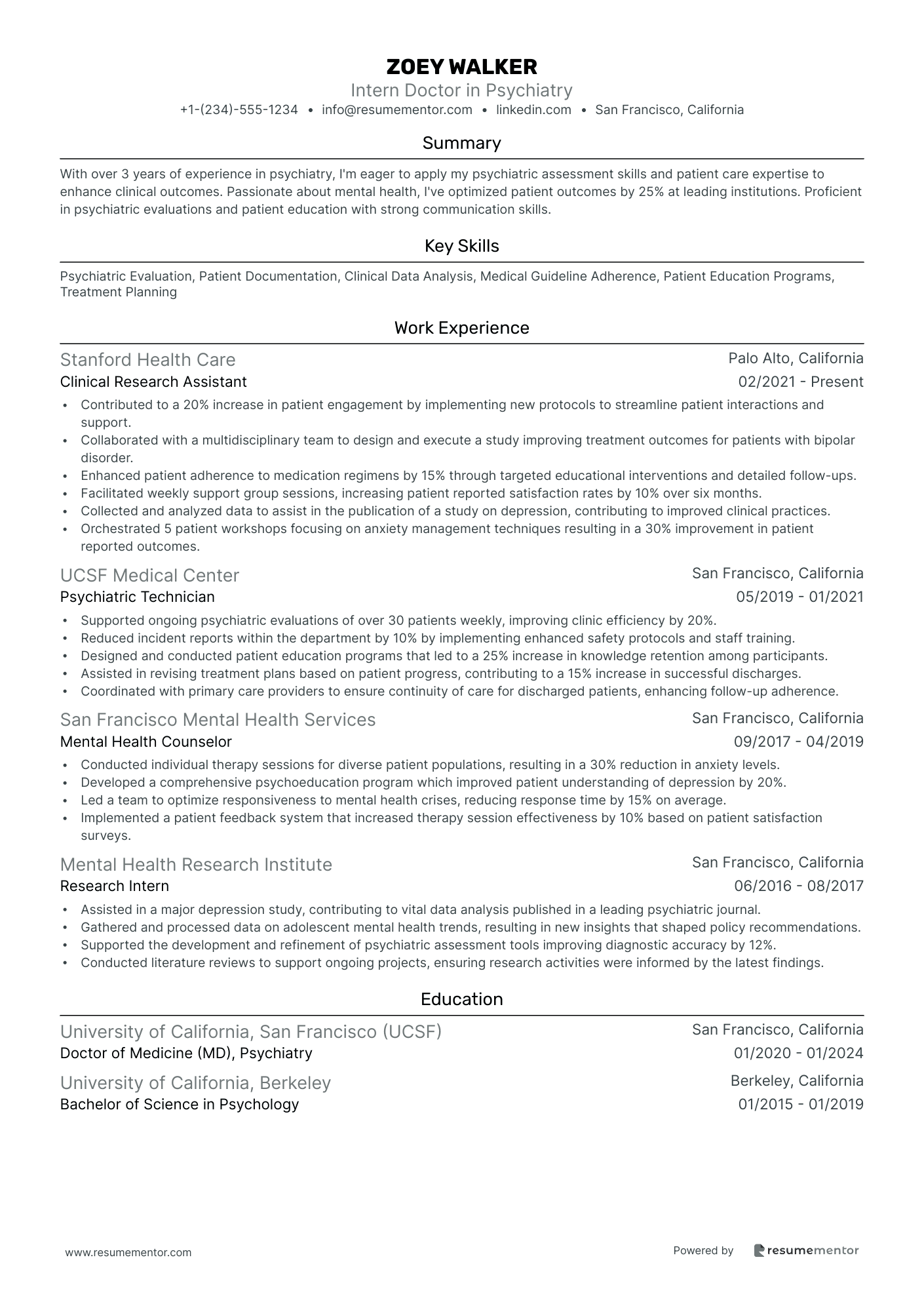
Intern Doctor in Psychiatry
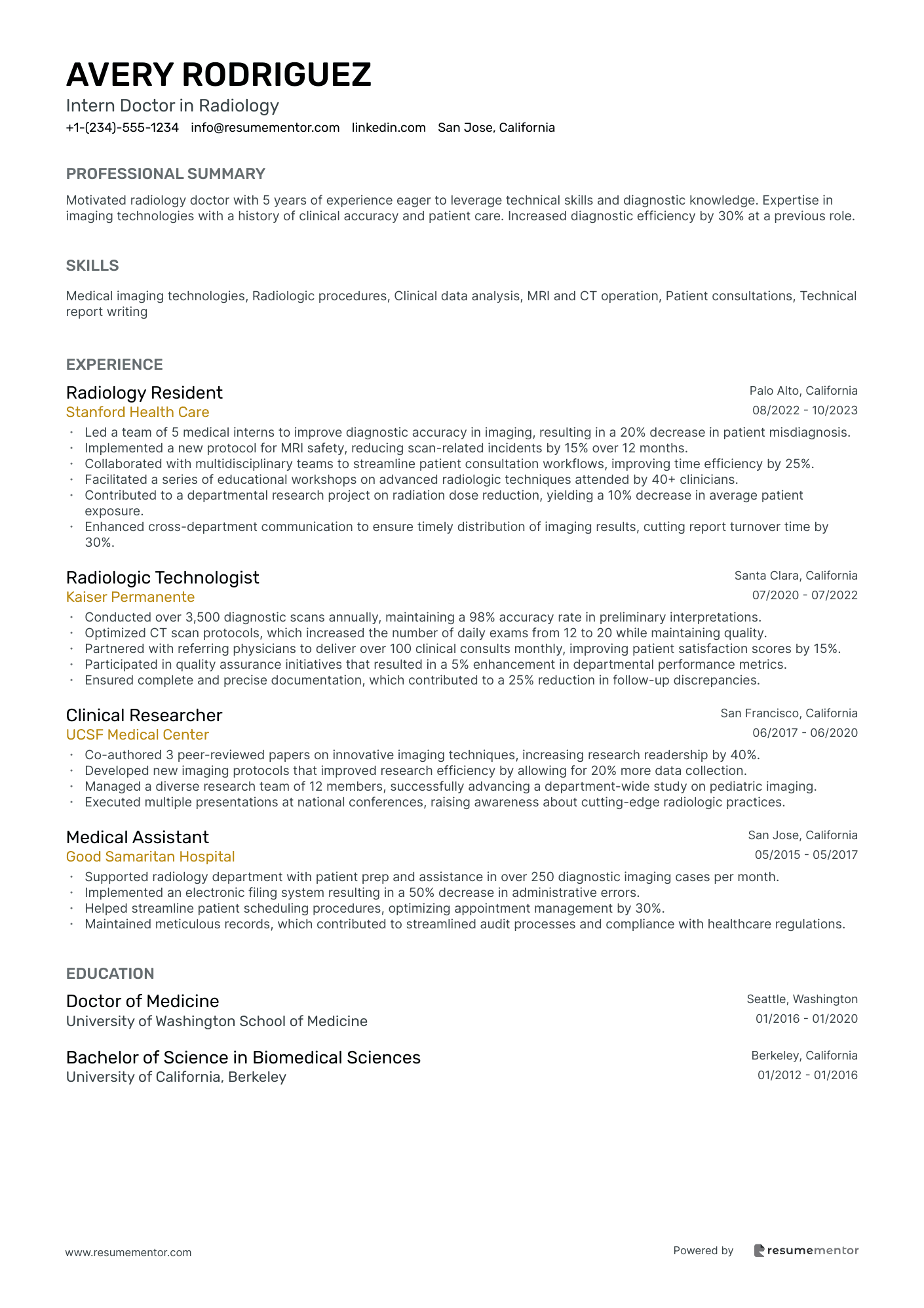
Intern Doctor in Radiology
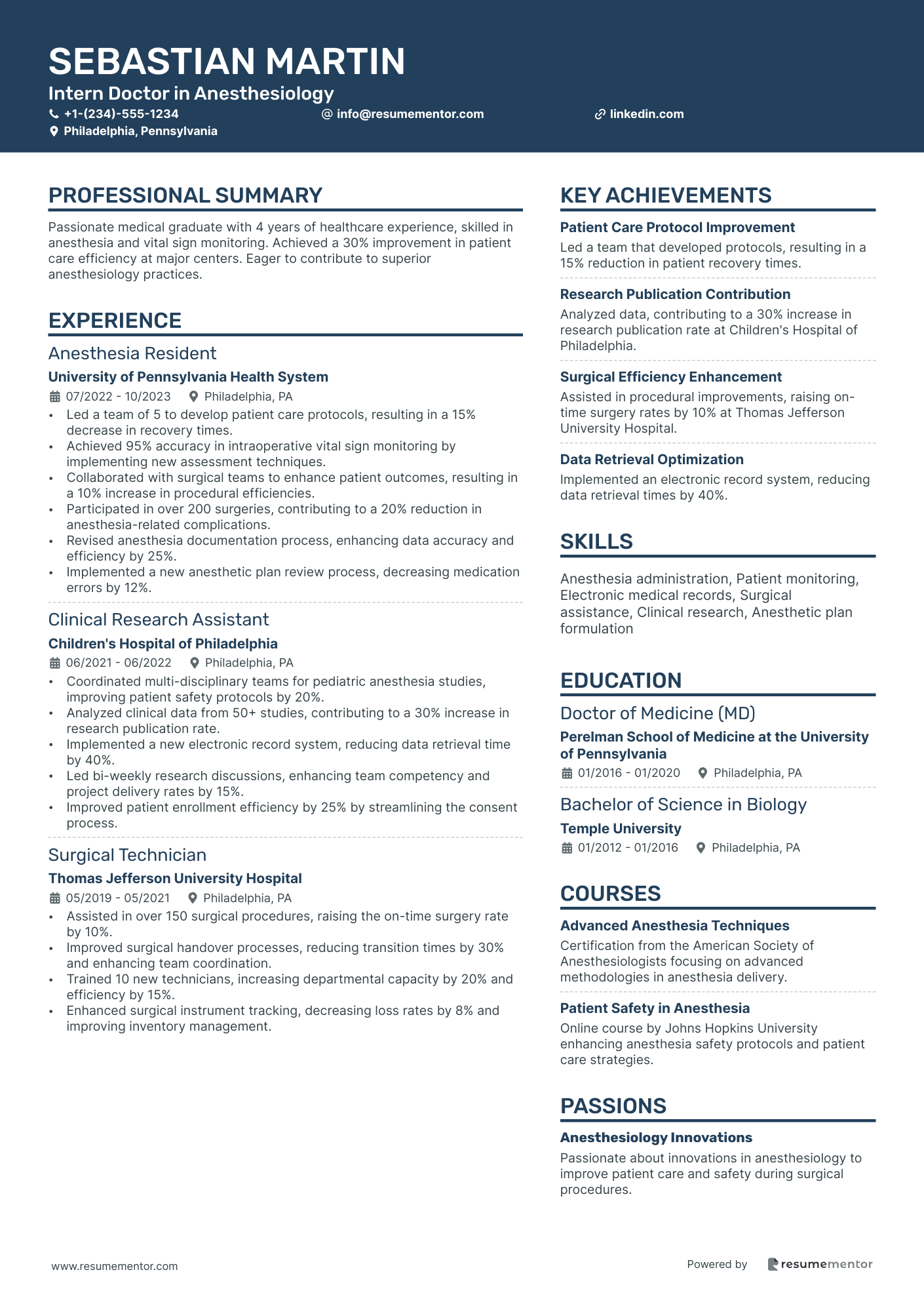
Intern Doctor in Anesthesiology

Intern Doctor in Pediatrics resume sample
- •Enhanced the pediatric patient care process, leading to a 30% increase in overall patient satisfaction in six months.
- •Collaborated with an interdisciplinary team to implement a new patient assessment protocol, reducing diagnosis time by 20%.
- •Participated actively in morning rounds, contributing to 100+ patient care plans per month.
- •Conducted comprehensive medical histories and physical examinations for over 300 pediatric patients annually.
- •Received recognition for outstanding performance in patient-centered care initiatives during clinical rotations.
- •Oversaw the administration of medications, ensuring accuracy and compliance with standard pediatric protocols.
- •Led a research project on pediatric asthma, resulting in a 25% improvement in management strategies within the department.
- •Presented findings on pediatric infectious diseases at three international conferences, gaining recognition from peers and academia.
- •Collaborated with a team of researchers to secure $150,000 in grant funding for a multi-year pediatric research initiative.
- •Authored and co-authored six peer-reviewed articles focused on pediatric healthcare advancements.
- •Trained and mentored 10 junior research assistants in data collection and publication processes.
- •Assisted in the improvement of pediatric electronic health records, achieving a 35% increase in documentation efficiency.
- •Worked closely with pediatricians to streamline communication with families, enhancing trust and patient adherence.
- •Developed and implemented a comprehensive training module for new medical staff, reducing onboarding time by 15%.
- •Participated in quality improvement projects aimed at reducing hospital readmission rates in pediatric patients.
- •Collaborated with a multidisciplinary team to improve pediatric care coordination, resulting in a 20% rise in patient outcomes.
- •Conducted health screenings and preventive care education for over 500 pediatric patients in the local community.
- •Assisted in patient procedure preparations, minimizing wait times by 10% through efficient workflow management.
- •Facilitated patient-family education sessions, improving understanding of pediatric health issues by 40%.
- •Engaged in departmental meetings and case discussions, contributing to the development of innovative pediatric care solutions.
Intern Doctor in Neurology resume sample
- •Assisted in a clinical trial studying pediatric neurological disorders, enabling the discovery of a new treatment approach.
- •Analyzed patient data and organized research findings, contributing to a 15% increase in study accuracy.
- •Collaborated with neurologists to implement new patient assessment protocols, resulting in improved diagnostic efficiency.
- •Guided over 100 patients through pre-assessment processes, enhancing department workflow and reducing wait times by 20%.
- •Participated in bi-weekly departmental meetings to discuss research progress, strategies, and outcomes, fostering interdisciplinary knowledge exchange.
- •Trained incoming interns on data management and research methodologies, strengthening the team’s research capabilities.
- •Managed a team of four in a project focused on stroke rehabilitation, achieving project milestones ahead of schedule by 25%.
- •Created comprehensive reports on patient outcomes and treatment efficacy, presented in monthly strategic meetings.
- •Facilitated interdepartmental coordination for a new EEG monitoring program, increasing patient monitoring by 40%.
- •Organized training seminars improving staff knowledge on neuroimaging techniques, boosting team diagnostic skills remarkably.
- •Involved in the implementation of a new patient database system, enhancing patient record retrieval speed by 30%.
- •Conducted assessments of healthcare program initiatives, contributing to the development of a successful patient recovery model.
- •Reduced missed patient follow-ups by 15% through systematic review and process improvements.
- •Prepared detailed analyses of patient care quality metrics, improving departmental strategies for care improvements.
- •Supported the rollout of a new telehealth program, aiding in a significant increase of digital patient engagement by 50%.
- •Collaborated on patient care strategies, resulting in an increase in patient satisfaction scores by 20%.
- •Reviewed patient data and provided insights that improved treatment plans for chronic neurological conditions.
- •Participated in cross-functional initiatives to improve service delivery, enhancing team effectiveness.
- •Assisted in training programs for staff on new healthcare technologies, increasing competency in new systems.
Intern Doctor in Cardiology resume sample
- •Coordinated a multi-phase clinical trial involving 200 patients to streamline data entry, leading to a 30% reduction in time consumption.
- •Developed and implemented a standardized documentation process, increasing record accuracy by 45% and reducing discrepancies in clinical data.
- •Collaborated with cardiologists to analyze echocardiogram results, facilitating enhanced diagnostics and treatment plans for 120 cases.
- •Participated in a multidisciplinary team meeting, resulting in the successful completion of a case review, improving patient care standards.
- •Presented research findings at a national cardiology conference, which contributed to a departmental recognition for innovation.
- •Led a project to integrate new heart monitoring technology into existing procedures, improving efficiency by 25%.
- •Assisted in over 300 cardiac catheterizations, using advanced imaging techniques to improve procedural outcomes by 20%.
- •Trained and supervised a team of 4 junior technicians, leading to skill improvement and increased departmental productivity by 15%.
- •Implemented a new scheduling system for stress tests, enhancing departmental efficiency and reducing wait times by 35%.
- •Optimized the equipment maintenance schedule, resulting in a 40% decrease in equipment downtime and increased availability.
- •Collaborated on a project that improved the success rate of non-invasive diagnostic tests by 28% over a six-month period.
- •Managed patient consultations independently under supervision, improving patient satisfaction scores by 18%.
- •Conducted detailed patient history taking, which contributed to quicker diagnosis times by 15% in a high-pressure environment.
- •Prepared comprehensive case studies on rare cardiovascular conditions, later utilized in educational seminars for peer learning.
- •Monitored the efficacy of ongoing cardiac treatment plans, leading to a protocol update that reduced adverse effects by 10%.
- •Provided support in daily patient care operations, contributing to the department's efficiency and patient satisfaction.
- •Assisted in over 150 echocardiogram procedures, ensuring accurate data collection and analysis critical for precise diagnostics.
- •Managed medical records for over 200 patients, achieving a new standard in documentation accuracy and completeness.
- •Participated in team training sessions to enhance capabilities in using the hospital's electronic medical record system.
Intern Doctor in General Surgery resume sample
- •Led a clinical trial project that resulted in a 25% increase in insightful data collection efficiency.
- •Spearheaded patient recruitment strategies leading to a 15% increase in participant enrollment in under 3 months.
- •Facilitated interdisciplinary team meetings to optimize research methodologies, achieving a 20% improvement in data accuracy.
- •Managed clinical databases, resulting in a streamlined data analysis process with 40% faster report generation.
- •Implemented a new reporting tool that enhanced patient data visualization, contributing to a 10% increase in stakeholder engagement.
- •Coordinated training sessions for 10+ staff, fostering a culture of compliance and reducing protocol deviations by 5%.
- •Developed and implemented a patient tracking system reducing appointment scheduling errors by 30%.
- •Collaborated with the healthcare team to refine patient admission processes, improving patient throughput time by 20%.
- •Launched a health education initiative impacting over 100 patients and reducing re-admission rates by 10%.
- •Mentored a team of 7 junior staff, enhancing service quality and a 15% improvement in patient feedback scores.
- •Monitored patient care plans, ensuring adherence to protocols, resulting in a 25% reduction in response times for critical cases.
- •Assisted in over 200 diagnostic procedures, ensuring a 98% accuracy rate in test results.
- •Optimized inventory management of medical supplies, reducing costs by 15% and maintaining high availability.
- •Implemented a safety protocol for laboratory operations, resulting in an accident-free working environment for 12 months.
- •Collaborated with technical teams for equipment maintenance, reducing downtime by 25% and enhancing service continuity.
- •Supported nursing staff in delivering high-quality care to over 300 patients in a high-pressure environment.
- •Conducted patient assessments and documented findings, ensuring comprehensive medical records for 100% of patients seen.
- •Achieved patient satisfaction scores of over 90% through empathetic communication and effective care coordination.
- •Participated in patient orientation sessions, resulting in a notable increase in patient understanding of treatment plans.
Intern Doctor in Orthopedics resume sample
- •Assisted in over 200 surgical procedures, including joint replacements and fracture fixations, increasing operation efficiency by 30%.
- •Conducted pre-surgical and post-operative patient assessments, improving patient recovery times by 15% through effective management.
- •Led a project on reducing operation room turnaround time, decreasing it by 25% by optimizing equipment setup processes.
- •Collaborated with a multidisciplinary team to manage complex pediatric cases, resulting in improved patient satisfaction ratings by 20%.
- •Implemented an electronic tracking system for orthopedic materials, reducing inventory losses by 18% within the first year.
- •Trained incoming staff on new surgical instruments, effectively integrating them into the team and improving surgical accuracy by 10%.
- •Coordinated a multi-phase clinical trial on bone health, improving participant retention by 40% and securing additional funding.
- •Analyzed patient data from over 500 records for research studies, leading to the publication of 3 peer-reviewed articles.
- •Monitored trial compliance with federal and institutional regulations, achieving a 100% compliance score across all studies.
- •Facilitated collaboration with 8 different departments, supporting successful outcomes in interdisciplinary research projects.
- •Developed an improved consent process for study participants, resulting in a 20% increase in participant understanding and engagement.
- •Conducted preliminary examinations on over 3000 patients annually, assisting physicians and ensuring high-quality patient care.
- •Streamlined patient check-in processes, reducing wait times by 35% through the implementation of a digital registration system.
- •Educated patients on orthopedic injury prevention, elevating community awareness and reducing re-injury rates by 10%.
- •Maintained patient records accurately, contributing to a 98% data accuracy rate in electronic health records.
- •Supported nursing staff in a high-volume orthopedic unit, positively impacting patient care and optimizing service delivery.
- •Participated in the care of over 50 patients daily, maintaining a standard of excellence praised by supervisors and patients.
- •Developed patient care plans for post-operative rehabilitation, leading to a 22% improvement in overall mobility progress.
- •Assisted in managing patient concerns, addressing them promptly and achieving a 90% satisfaction rate in feedback surveys.
Intern Doctor in Dermatology resume sample
- •Contributed to a clinical study that resulted in a 20% increase in treatment efficacy, enhancing patient outcomes significantly.
- •Developed a new documentation protocol that improved data entry accuracy by 15% and reduced errors in research findings.
- •Assisted in the formulation of patient care plans for dermatological issues, resulting in enhanced patient satisfaction scores by 12%.
- •Coordinated with dermatologists to streamline biopsy procedures, reducing average procedure completion time by 18%.
- •Implemented patient feedback mechanisms, which led to a 25% increase in patient engagement and service improvement.
- •Accurately transcribed complex medical details, resulting in a 28% improvement in clinical documentation clarity.
- •Facilitated communication between doctors and patients, which increased the consultation process efficiency by 35%.
- •Standardized the medical records entry process, reducing discrepancies and ensuring compliance with health records laws.
- •Collaborated with a team to update the patient management system, enhancing data retrieval efficiency by 40%.
- •Played an integral role in team discussions, contributing to strategic improvements in patient follow-up care.
- •Assisted in dermatological assessments, improving diagnostic accuracy and patient treatment plans by 20%.
- •Managed patient inquiries, which enhanced patient trust and satisfaction, evidenced by a 30% rise in positive feedback.
- •Organized and maintained patient records, increasing file accessibility and security by implementing new technologies.
- •Supported patient procedures, minimizing preparation time and enhancing the patient experience by 25%.
- •Facilitated skin condition screenings, contributing to early detection and increasing treatment success rates by 15%.
- •Coordinated patient appointments, improving scheduling efficiency by 20% and reducing wait times significantly.
- •Implemented patient history tracking measures that boosted record accuracy and compliance with healthcare standards.
- •Assisted in developing new patient care protocols, streamlining the consultation process and enhancing patient outcomes.
Intern Doctor in Ophthalmology resume sample
- •Led a team to reduce post-operative complications by 25% through innovative patient education and follow-up strategies.
- •Implemented a screening protocol that increased early detection of retinal diseases by 15%, enhancing patient outcomes.
- •Participated in over 200 complex eye surgeries annually, contributing to a decrease in surgical times by 20%.
- •Streamlined clinic operations by integrating a digital records system, improving appointment efficiency by 30%.
- •Trained a group of 10 junior doctors in precision techniques for laser eye procedures, boosting clinic capability.
- •Collaborated in research that resulted in a 20% improvement in corrective vision treatments through new methodologies.
- •Enhanced the patient intake process, reducing check-in times by 40% and improving patient satisfaction ratings.
- •Successfully managed 50 patient follow-ups per week, ensuring precise monitoring of post-operative care.
- •Conducted extensive patient vision studies, contributing to a research publication on diabetic eye disease management.
- •Developed and implemented a patient-centric care model that reduced unnecessary ER visits by 30%.
- •Improved coordination with external specialists to expedite care processes, leading to a 15% improvement in referral response times.
- •Analyzed data for an eye research project, resulting in a paper that outlined new treatment methodologies for glaucoma.
- •Collaborated with a team to develop a novel imaging method that increased diagnostic precision by 25%.
- •Managed a database of over 2,000 patient records, maintaining high data integrity and accessibility for research use.
- •Provided training workshops for junior staff on the latest eye imaging software, enhancing clinic capability.
- •Assisted in over 500 patient evaluations annually, improving diagnostic accuracy rates by 15%.
- •Utilized advanced imaging tools to conduct over 1,000 preliminary tests, supporting comprehensive patient assessments.
- •Developed a patient education program that increased understanding of eye care practices by 30%.
- •Collaborated with clinical teams to create detailed reports that enhanced patient treatment plans by increasing precision.
Intern Doctor in Psychiatry resume sample
- •Contributed to a 20% increase in patient engagement by implementing new protocols to streamline patient interactions and support.
- •Collaborated with a multidisciplinary team to design and execute a study improving treatment outcomes for patients with bipolar disorder.
- •Enhanced patient adherence to medication regimens by 15% through targeted educational interventions and detailed follow-ups.
- •Facilitated weekly support group sessions, increasing patient reported satisfaction rates by 10% over six months.
- •Collected and analyzed data to assist in the publication of a study on depression, contributing to improved clinical practices.
- •Orchestrated 5 patient workshops focusing on anxiety management techniques resulting in a 30% improvement in patient reported outcomes.
- •Supported ongoing psychiatric evaluations of over 30 patients weekly, improving clinic efficiency by 20%.
- •Reduced incident reports within the department by 10% by implementing enhanced safety protocols and staff training.
- •Designed and conducted patient education programs that led to a 25% increase in knowledge retention among participants.
- •Assisted in revising treatment plans based on patient progress, contributing to a 15% increase in successful discharges.
- •Coordinated with primary care providers to ensure continuity of care for discharged patients, enhancing follow-up adherence.
- •Conducted individual therapy sessions for diverse patient populations, resulting in a 30% reduction in anxiety levels.
- •Developed a comprehensive psychoeducation program which improved patient understanding of depression by 20%.
- •Led a team to optimize responsiveness to mental health crises, reducing response time by 15% on average.
- •Implemented a patient feedback system that increased therapy session effectiveness by 10% based on patient satisfaction surveys.
- •Assisted in a major depression study, contributing to vital data analysis published in a leading psychiatric journal.
- •Gathered and processed data on adolescent mental health trends, resulting in new insights that shaped policy recommendations.
- •Supported the development and refinement of psychiatric assessment tools improving diagnostic accuracy by 12%.
- •Conducted literature reviews to support ongoing projects, ensuring research activities were informed by the latest findings.
Intern Doctor in Radiology resume sample
- •Led a team of 5 medical interns to improve diagnostic accuracy in imaging, resulting in a 20% decrease in patient misdiagnosis.
- •Implemented a new protocol for MRI safety, reducing scan-related incidents by 15% over 12 months.
- •Collaborated with multidisciplinary teams to streamline patient consultation workflows, improving time efficiency by 25%.
- •Facilitated a series of educational workshops on advanced radiologic techniques attended by 40+ clinicians.
- •Contributed to a departmental research project on radiation dose reduction, yielding a 10% decrease in average patient exposure.
- •Enhanced cross-department communication to ensure timely distribution of imaging results, cutting report turnover time by 30%.
- •Conducted over 3,500 diagnostic scans annually, maintaining a 98% accuracy rate in preliminary interpretations.
- •Optimized CT scan protocols, which increased the number of daily exams from 12 to 20 while maintaining quality.
- •Partnered with referring physicians to deliver over 100 clinical consults monthly, improving patient satisfaction scores by 15%.
- •Participated in quality assurance initiatives that resulted in a 5% enhancement in departmental performance metrics.
- •Ensured complete and precise documentation, which contributed to a 25% reduction in follow-up discrepancies.
- •Co-authored 3 peer-reviewed papers on innovative imaging techniques, increasing research readership by 40%.
- •Developed new imaging protocols that improved research efficiency by allowing for 20% more data collection.
- •Managed a diverse research team of 12 members, successfully advancing a department-wide study on pediatric imaging.
- •Executed multiple presentations at national conferences, raising awareness about cutting-edge radiologic practices.
- •Supported radiology department with patient prep and assistance in over 250 diagnostic imaging cases per month.
- •Implemented an electronic filing system resulting in a 50% decrease in administrative errors.
- •Helped streamline patient scheduling procedures, optimizing appointment management by 30%.
- •Maintained meticulous records, which contributed to streamlined audit processes and compliance with healthcare regulations.
Intern Doctor in Anesthesiology resume sample
- •Led a team of 5 to develop patient care protocols, resulting in a 15% decrease in recovery times.
- •Achieved 95% accuracy in intraoperative vital sign monitoring by implementing new assessment techniques.
- •Collaborated with surgical teams to enhance patient outcomes, resulting in a 10% increase in procedural efficiencies.
- •Participated in over 200 surgeries, contributing to a 20% reduction in anesthesia-related complications.
- •Revised anesthesia documentation process, enhancing data accuracy and efficiency by 25%.
- •Implemented a new anesthetic plan review process, decreasing medication errors by 12%.
- •Coordinated multi-disciplinary teams for pediatric anesthesia studies, improving patient safety protocols by 20%.
- •Analyzed clinical data from 50+ studies, contributing to a 30% increase in research publication rate.
- •Implemented a new electronic record system, reducing data retrieval time by 40%.
- •Led bi-weekly research discussions, enhancing team competency and project delivery rates by 15%.
- •Improved patient enrollment efficiency by 25% by streamlining the consent process.
- •Assisted in over 150 surgical procedures, raising the on-time surgery rate by 10%.
- •Improved surgical handover processes, reducing transition times by 30% and enhancing team coordination.
- •Trained 10 new technicians, increasing departmental capacity by 20% and efficiency by 15%.
- •Enhanced surgical instrument tracking, decreasing loss rates by 8% and improving inventory management.
- •Performed over 300 patient assessments, enhancing diagnostic accuracy by 15%.
- •Developed a patient follow-up mechanism, increasing follow-up compliance rates by 25%.
- •Collaborated with healthcare providers, improving the multidisciplinary care approach and reducing patient complaints by 10%.
- •Organized educational seminars, resulting in a 30% increase in staff participation.
As an intern doctor stepping into the competitive medical field, crafting a strong resume is crucial. Your resume acts like a passport to new opportunities, clearly highlighting your skills and achievements. Finding the balance between detailing your qualifications and keeping it concise can be challenging.
Rather than just listing experiences, aim to paint a vivid picture of your dedication and potential in medicine. By emphasizing both your medical expertise and your passion, you ensure that each section of your resume highlights your unique capabilities. Include details about your clinical rotations and research projects to make your qualifications shine.
To streamline this process, consider using a resume template. A template organizes your information, ensuring clarity and professionalism while helping your experiences resonate with employers. This structured format lets you make a strong impression without overwhelming potential employers with too much detail.
As you advance in your career, a well-crafted resume becomes an invaluable tool. While the journey can seem daunting, a carefully structured resume can set you apart and help realize your aspirations. Stay focused on representing yourself authentically and making a meaningful impact.
Key Takeaways
- An intern doctor's resume should emphasize medical knowledge, patient care skills, and eagerness to learn, presenting a clear picture of professional growth potential.
- The resume should include clinical rotations and research projects, showcasing practical skills and contributions to medical knowledge.
- A professional, chronological format and clean design, using modern fonts and consistent margins, enhance readability and professionalism.
- Quantifiable achievements, clear action verbs, and a focus on experiences aligned with job descriptions strengthen the resume's impact.
- Balancing hard skills, like clinical procedures, and soft skills, such as teamwork and empathy, in your resume highlights your comprehensive capabilities.
What to focus on when writing your intern doctor resume
An intern doctor resume should clearly convey your medical knowledge, patient care skills, and eagerness to learn, painting a picture of your potential to grow as a healthcare professional. Recruiters want to see your dedication to the medical field, which begins with how you present your contact information—include your full name, phone number, and a professional email. Consider adding your LinkedIn profile or any relevant online portfolio, as these can provide a fuller picture of your professional persona and make it easier for recruiters to verify your qualifications and commitments.
How to structure your intern doctor resume
- Contact Information: Include your full name, phone number, and a professional email. Add your LinkedIn profile and any relevant online portfolio if available.
- Objective Statement: Write a brief statement outlining your career goals and what you aim to achieve as an intern doctor. Highlight your enthusiasm for patient care and your desire to learn.
- Education: List your medical school, degree obtained, and graduation date. Mention honors or any coursework that aligns with your medical interests.
- Clinical Rotations: Detail your experience in different medical specialties. Include the location and duration of each rotation to show your diverse exposure.
- Medical Skills: Highlight skills like patient assessment, diagnostic abilities, familiarity with medical software, and teamwork. Tailor these to emphasize your strengths.
- Research or Publications: List any research projects, papers, or presentations you've completed. Include the topic and your role to show your contribution to medical knowledge.
Further enhance your resume with any research projects, papers, or presentations you've been part of, providing details on the topic and your role, emphasizing your contribution to advancing medical knowledge. These accomplishments can give your resume additional depth and demonstrate your initiative beyond the standard curriculum. To round out your resume, consider adding optional sections for certifications, volunteer experiences, or languages spoken. Offering a deeper glimpse into your diverse skills and experiences in the medical field, these sections can add richness to your resume. Now, let's discuss the resume format and delve more in-depth into each essential section.
Which resume format to choose
Crafting a resume as an intern doctor means highlighting your strengths with a clear and professional format. Using a chronological layout allows you to effectively showcase your education and any hands-on experience, crucial for the medical field where learning builds over time. To give your resume a modern touch, consider fonts like Lato, Montserrat, or Raleway; these fonts provide both clarity and a contemporary feel, aligning well with the innovative nature of healthcare. It's essential to save your resume as a PDF, which preserves your design across all platforms, ensuring that hiring managers see it exactly as you intended. Maintaining consistent one-inch margins on all sides will keep your document looking organized and easy to navigate, reinforcing your attention to detail—a vital trait in any medical professional. Together, these elements create a polished resume that helps your qualifications shine in the competitive medical environment.
How to write a quantifiable resume experience section
The experience section of your intern doctor resume is essential because it's where your skills and accomplishments in medical settings really come to life. By focusing on specific achievements and responsibilities, and using action verbs alongside precise metrics, you create a compelling narrative of your professional journey. The way you organize your experience should flow in reverse chronological order, highlighting your most recent and relevant roles, which helps employers see your growth and current expertise. Cover significant experiences from the last 5 to 10 years, tailoring them to align with the job ad. This personalized approach ensures that your resume emphasizes experiences and skills directly matching the job description. Strong action verbs like “diagnosed,” “collaborated,” “implemented,” and “managed” drive your points home and showcase your proactive stance.
Consider this example of a strong experience section:
- •Participated in over 200 patient assessments, helping develop treatment plans.
- •Worked with a team of 10+ healthcare professionals to introduce a new patient tracking system, cutting paperwork errors by 30%.
- •Assisted in emergency procedures for over 50 cases, boosting response times by 25%.
- •Led weekly interdisciplinary meetings, improving departmental communication by 40%.
This experience section is cohesive because it uses specific metrics to clearly show your impact, making it easier for hiring managers to appreciate your contributions. Each bullet point flows logically from the next, presenting measurable outcomes that highlight your success. With action verbs driving the points and illustrating a proactive approach, your narrative remains engaging. The section not only highlights your achievements but also aligns closely with job descriptions, emphasizing the skills and experiences that employers are actively seeking. This connection strengthens your resume, positioning you as an ideal candidate for a medical internship.
Customer-Focused resume experience section
A Customer-Focused intern doctor resume experience section should effectively highlight your ability to empathize and communicate while prioritizing patient care. Start by sharing experiences where you interacted with patients, providing support, education, or guidance that truly made a difference. Aim to demonstrate how collaborating with medical staff led to enhanced patient satisfaction, showing that your teamwork translated into better patient experiences. Each experience should illustrate how you contributed to positive outcomes for patients or helped improve processes to better cater to their needs.
Focus not only on what you accomplished but also on the impact of your actions. Begin each bullet point with a strong action verb and mention tangible results, like improved patient understanding or reduced anxiety. This will underline your proactive approach and capability in implementing meaningful improvements in patient care.
Intern Doctor
City Children’s Hospital
June 2022 - August 2022
- Assisted pediatric patients by explaining medical procedures with age-appropriate language to ease anxiety.
- Worked seamlessly with nurses and doctors to improve the patient check-in process, reducing wait times by 20%.
- Provided emotional support and shared educational resources with parents, leading to higher satisfaction in feedback surveys.
- Set up a feedback system for patient and family suggestions, enhancing service delivery by addressing their concerns quickly.
Responsibility-Focused resume experience section
A responsibility-focused intern doctor resume experience section should begin by identifying your key roles and tasks during each internship. Next, highlight specific duties and clinical rotations that not only demonstrate your skills but also reflect the level of trust supervisors placed in you. This method effectively communicates your understanding of the complexities within a clinical environment.
Furthermore, emphasize your hands-on experiences, as well as any supervisory or project-related roles, to illustrate your active participation within the medical team. Clearly express how your contributions positively influenced patient care, thereby supporting teamwork and fostering a collaborative atmosphere. Use straightforward, concise bullet points to highlight significant accomplishments or tasks, ensuring your readiness for a professional role is evident through these illustrated experiences.
Pediatric Intern
Green Valley Hospital
June 2022 - August 2022
- Assisted in the daily management and care of over 20 pediatric patients under the supervision of licensed pediatricians.
- Performed basic clinical procedures, including administering vaccinations and checking vital signs.
- Supported doctors and nurses in the ward during rounds, documenting patient progress accurately and thoroughly.
- Collaborated with healthcare professionals to provide comprehensive patient care and improve patient outcomes.
Skills-Focused resume experience section
A skills-focused intern doctor resume experience section should clearly highlight the abilities and growth you've achieved during your training. Start by pinpointing the key skills you developed, such as effectively managing busy environments, communicating smoothly with patients and medical staff, and handling clinical tasks. By listing these experiences, you can demonstrate your impact using strong action verbs and quantifiable achievements.
This way, your bullet points not only outline what you did but also show how you improved your skills in applicable areas. Provide details, like your tech proficiency and teamwork capabilities, in a concise and relevant manner. This approach ensures that potential employers see not just your past duties but also how you’re equipped to contribute to their team. A well-structured resume like this can significantly ease your path forward in the medical field.
Intern Doctor
City Hospital
Jan 2023 - June 2023
- Helped diagnose and plan treatments for patients under supervision.
- Worked with a team of professionals to enhance patient care and improve clinical processes.
- Learned to use electronic medical record (EMR) systems and improved documentation accuracy.
- Participated in weekly meetings, offering insights on case studies and treatment protocols.
Technology-Focused resume experience section
A technology-focused intern doctor resume experience section should begin by clearly outlining your role and the context in which you gained this experience. By focusing on responsibilities and achievements involving technology in the medical field, you can highlight your unique contributions. Share specific tasks or projects that showcased innovative uses of technology, and be sure to mention the outcomes. Whenever possible, quantify these achievements, such as improvements in processes or how your work impacted patient care. This helps provide concrete evidence of your skills. Use active verbs throughout to vividly convey your contributions, bringing your role to life.
Organize your details using bullet points to make them easy for recruiters to read and understand quickly. This allows them to grasp important aspects of your experience at a glance. Emphasize your adaptability to new technologies and approaches, underscoring your readiness for a dynamic medical environment. Each bullet should offer insight into your problem-solving abilities, your teamwork skill set, and any leadership roles you embraced. Through this well-structured format, you can highlight not only your technical expertise but also your capacity to apply these skills effectively in a clinical setting.
Technology Intern
City General Hospital
June 2022 - August 2023
- Collaborated with senior doctors to develop a digital patient record system that reduced paperwork by 30%.
- Conducted research on telemedicine tools and presented findings to enhance remote patient consultations.
- Assisted in implementing machine learning algorithms to predict patient readmission rates with 80% accuracy.
- Led a team to create an app for appointment booking, increasing efficiency by 25%.
Write your intern doctor resume summary section
A results-focused intern doctor resume should start with a strong summary that clearly highlights your skills and experiences. Unlike a resume objective that focuses on future goals, a summary emphasizes what you've already accomplished. This is particularly valuable for an intern doctor position, where practical experience is critical. Consider the following example:
Here, the summary effectively outlines your medical training and specific rotations you've completed. It emphasizes not just your skills but also your commitment to compassionate healthcare. This approach makes you stand out as someone ready to make a positive impact, which is essential for an intern doctor. When describing yourself, choose words like "dedicated," "enthusiastic," or "skilled" to highlight your strengths.
Understanding the distinction between a summary and an objective can help refine your approach. A summary focuses on your past achievements, setting the stage for what you bring to the table. In contrast, an objective might be more forward-looking, detailing your aspirations. Tailoring your summary to the specific role aligns your experiences with the employer's needs. In this way, your resume not only reflects your abilities but also your readiness to contribute effectively in a new team environment.
Listing your intern doctor skills on your resume
A skills-focused intern doctor resume should clearly highlight your strengths and abilities that set you apart in the medical field. You can showcase these skills as a standalone section or seamlessly integrate them into parts like the experience and summary sections. When you discuss your strengths, focus on qualities such as communication, teamwork, and problem-solving—these are your vital soft skills. In contrast, hard skills are the specific, teachable abilities you've honed, like performing medical procedures or conducting data analysis.
Including the right blend of skills and strengths on your resume serves as powerful keywords that can grab the attention of recruiters. Here's an example of how you might construct a standalone skills section that emphasizes critical skills for an intern doctor:
This skills section succeeds by balancing essential medical abilities with collaboration skills. Notice how each skill is directly relevant to the everyday responsibilities of an intern doctor, demonstrating what you bring to a medical team. It's both concise and comprehensive, allowing recruiters to quickly recognize your qualifications.
Best hard skills to feature on your intern doctor resume
Intern doctors should emphasize hard skills that reflect their clinical expertise and technical proficiency. These skills are derived from education and training, enabling you to manage the practical aspects of patient care and research effectively. They establish your competence in handling the technical demands of the role.
Hard Skills
- Patient Assessment
- Basic Life Support (BLS)
- Advanced Cardiovascular Life Support (ACLS)
- Diagnostic Testing
- Clinical Data Analysis
- Medical Record Keeping
- Disease Management
- Laboratory Techniques
- Medication Administration
- Phlebotomy
- Surgery Assistance
- Emergency Care
- Patient Care Planning
- Infection Control
- Medical Equipment Operation
Best soft skills to feature on your intern doctor resume
Equally important are the soft skills that highlight your capacity for interpersonal interactions and sound decision-making. These skills demonstrate your ability to collaborate effectively, adapt to changing situations, and manage the emotional aspects of a medical environment. They illustrate your capability to empathize, communicate, and remain composed under pressure.
Soft Skills
- Communication
- Problem-Solving
- Teamwork
- Adaptability
- Empathy
- Attention to Detail
- Stress Management
- Time Management
- Critical Thinking
- Decision-Making
- Conflict Resolution
- Leadership
- Patience
- Active Listening
- Emotional Intelligence
How to include your education on your resume
The education section is a crucial part of an intern doctor's resume. It's where you show your academic background and qualifications. Tailoring this section to the specific medical position you're applying for is important. Include only relevant education; unrelated degrees could clutter your resume. If you have a strong GPA, you should consider including it, typically as a number with a max GPA in parentheses (e.g., 3.8/4.0). Honors like cum laude should also be included, as they highlight academic achievement. When listing your degree, start with the highest level attained and detail the institution, location, and date.
Incorrect example:
Correct example:
The correct example focuses on showing the relevant medical education for an intern doctor, which is directly related to the job role. It effectively places the spotlight on a significant achievement—a Doctor of Medicine degree. It also highlights a strong GPA, which indicates high performance and dedication in the field. This well-structured, relevant education listing makes a positive impression on potential employers.
In Conclusion
In conclusion, as you begin your journey as an intern doctor, crafting a clear and impactful resume is essential to making strides in the competitive medical field. Your resume should serve as a compelling narrative, illustrating not only your medical knowledge but also your passion for patient care and ongoing learning. Each section, from education to experience, offers a unique chance to showcase your skills and accomplishments. Use them to tell a cohesive story that resonates with recruiters and highlights your professional growth.
Remember to leverage a professional resume template that promotes clarity and succinctness, helping potential employers swiftly grasp your qualifications. By tailoring your resume’s content and structure to the role you're applying for, you ensure it aligns with the recruiters’ needs and expectations. Highlight your roles in clinical settings, emphasizing your dedication, collaboration, and initiative in improving patient care. Utilize action verbs and specific metrics in your experience section to vividly paint your contributions and achievements.
Furthermore, balance your technical skills with soft skills to demonstrate your comprehensive capability as a healthcare provider. Whether discussing your communication strengths or your proficiency with emerging medical technologies, present a well-rounded image of your abilities. Additionally, a well-thought-out summary can set the tone for your application, offering a quick snapshot of your background and aspirations.
Overall, your resume is a powerful tool that can open doors to new opportunities in your budding medical career. By carefully crafting it to reflect your authentic self while aligning with industry demands, you set the stage for a successful future in medicine. Stay committed to your professional development, and your resume will naturally grow to reflect your journey in the medical field.
Related Articles

Continue Reading
Check more recommended readings to get the job of your dreams.
Resume
Resources
Tools
© 2026. All rights reserved.
Made with love by people who care.

